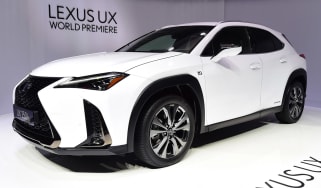Lexus UX review
The Lexus UX hybrid is good to drive, economical and should be easy to live with, too

Quick verdict
Based on our experience, the Lexus UX is an interesting alternative to the best compact SUVs you can buy. The styling is daring and different, the interior is finished to the usual Lexus high standards, and it’s loaded with an impressive array of safety equipment.
But, the UX doesn't really stack up as an overall package; rear cabin space isn't great, which might be a concern for family buyers. The hybrid models won't win over many business users, either, as CO2 emissions aren't as competitive as plug-in rivals, while the fully electric UX 300e is expensive and doesn't come close to the range or charging speeds offered by BMW, Mercedes or Volvo's smallest electric SUVs.
|
Key specs | |
|
Fuel type |
petrol/electric hybrid, electric |
|
Body style |
5-door small SUV |
|
Powertrain |
2.0-litre, 4cyl petrol plus 1x e-motor, front-wheel drive 2.0-litre, 4cyl petrol plus 1x e-motor, four-wheel drive 72.8kWh battery, 1x e-motor, front-wheel drive |
|
Safety |
5-star Euro NCAP (2019) |
|
Warranty |
3yrs/60k miles (up to 10yrs/100k miles with routine franchised dealer servicing) |
Lexus UX: price, specs and rivals
Lexus practically invented the premium crossover when it launched the RX in 1998, but the luxury brand was a little late to the compact SUV party and slow to get an EV to market. Even so, Lexus launched its NX back in 2014, the UX three years later and three years after that production of its first-ever electric car – the UX 300e – finally started.
The UX goes head-to-head with the likes of the Mercedes GLA, BMW X1, Audi Q3, Alfa Romeo Tonale and Volvo XC40, but with a coupe-like profile and sporty driving characteristics, its closest rival is arguably the BMW X2. It's a similar story for the UX 300e which faces competition from the BMW iX1 and Mercedes EQA, plus the Volvo EX40 and Volvo EC40.
Used - available now
The UX is based on an adaptation of Toyota’s TNGA platform (called GA-C in Lexus speak), which means it shares its underpinnings with the Toyota Prius and Toyota C-HR. Thanks to the high-voltage electronics assisting the petrol engine, all UX models promise good fuel consumption, although tailpipe emissions aren't able to compete with figures from plug-in hybrid rivals.
On a positive note, the UX will reward keen drivers with tight body control, plenty of grip, sharp steering and a composed ride. Even the standard-fit CVT transmission feels smooth and linear.
There are three drivetrains available in the UK. The first, which has been around the longest, is Lexus and Toyota’s venerable 2.0-litre petrol-electric hybrid system that sends power to the front wheels. These models are badged as “300h”. The second is also a petrol-electric hybrid but is four-wheel-drive and gets “E-Four” added to the end of its name. Last but not least is the fully-electric “300e” which arrived towards the end of 2020, but has since been upgraded with a much larger 72.8kWh battery later, boosting the compact electric SUV’s range from 196 to 279 miles.
In typical Lexus fashion, the standard specification is high, including a comprehensive array of active and passive safety devices. There are up to eight different trim levels for the hybrid version, and three for the electric 300e. Prices start from just under £35,000, but rise to more than £57,000 for the flagship battery-powered model.
Engines, performance & drive
The Lexus UX has good body control, well-judged steering, and a nicely calibrated hybrid system that generally avoids needing to send the revs soaring in everyday driving. The ride is a little on the firm side, but it avoids feeling crashy. All versions (including the electric 300e) provide enough performance. Read more about the Lexus UX's engines, performance and drive…
MPG, emissions & running costs
The hybrid UX will outperform its regular petrol or diesel rivals for both fuel efficiency and emissions, but you don’t get a plug-in hybrid alternative like its BMW X1 rival to lower the BiK tax bill for company car drivers. True, there is an all-electric 300e model, but its poor charging speed and CHAdeMO charging connector put it at a disadvantage against rivals, plus the 300e will be hammered by depreciation when it comes to trade in time after three years or 36,000 miles. Read more about the Lexus UX's MPG, emissions and running costs…
Interior, design & technology
The styling of the UX helps set it apart from other small SUVs, and we applaud that there’s some variety in the colour brochure beyond multiple shades of grey (Terrane Khaki is one of our favourites). The interior is finished in materials that wouldn’t look out of place in any of its Audi, BMW, or Mercedes rivals, helping to justify its premium billing. An improved infotainment system fixes many of the issues we’ve had with previous versions of UX. Read more about the Lexus UX's interior, design and technology…
Boot space, comfort & practicality
The UX doesn’t have the stature of other SUVs, and while it’s big enough up front for taller adults, the rear isn’t particularly spacious compared with competitors like the Volvo XC40, and the narrow window line can make it feel a little claustrophobic. The boot in the UX is also very small compared with the best in the class, limiting the useability of the UX as a family car. Read more about the Lexus UX's boot space, comfort and practicality…
Reliability & safety
Like most modern Lexus cars, the UX has many safety assistance systems to support its five-star Euro NCAP crash test score. The brand also has a well-earned reputation for building dependable cars, and the UX lives up to that expectation by finishing ahead of a number of its SUV and EV rivals. There’s also a long warranty for additional peace of mind. Read more about the Lexus UX’s reliability and safety…
Should you buy a Lexus UX?
The latest round of improvements to the Lexus UX will keep Lexus buyers happy, while the upgraded infotainment system removes one of our biggest issues with the previous version. Its efficient hybrid system and excellent build quality could tempt people who are considering thirstier petrol models of Audi Q2, BMW X1 or Mercedes GLA. The Lexus brand has generally done very well in previous Driver Power customer satisfaction surveys, so the UX should appeal to those who value an easy life.
However, the UX is best experienced in cheaper trim levels, because it’s difficult to justify the price of high-end versions, especially considering how small its boot is or how tight it is in the back for taller adults compared with rivals.
The electric 300e is hard to recommend compared with excellent alternatives like the BMW iX1, Genesis GV60 or Volvo EX30. The electric 300e is also even more expensive than the regular hybrid, and sheds its value at an alarming rate.






















